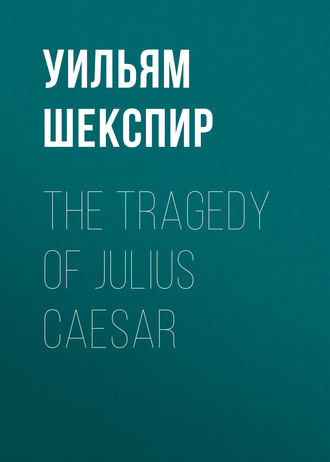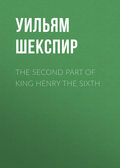полная версия

Уильям Шекспир
The Tragedy of Julius Caesar
SCENE II. Caesar's house. Thunder and lightning
Enter Caesar, in his nightgown.
CAESAR. Nor heaven nor earth have been at peace tonight.
Thrice hath Calpurnia in her sleep cried out,
"Help, ho! They murther Caesar!" Who's within?
Enter a Servant.
SERVANT. My lord?
CAESAR. Go bid the priests do present sacrifice,
And bring me their opinions of success.
SERVANT. I will, my lord. Exit.
Enter Calpurnia.
CALPURNIA. What mean you, Caesar? Think you to walk forth?
You shall not stir out of your house today.
CAESAR. Caesar shall forth: the things that threaten'd me
Ne'er look'd but on my back; when they shall see
The face of Caesar, they are vanished.
CALPURNIA. Caesar, I I stood on ceremonies,
Yet now they fright me. There is one within,
Besides the things that we have heard and seen,
Recounts most horrid sights seen by the watch.
A lioness hath whelped in the streets;
And graves have yawn'd, and yielded up their dead;
Fierce fiery warriors fight upon the clouds,
In ranks and squadrons and right form of war,
Which drizzled blood upon the Capitol;
The noise of battle hurtled in the air,
Horses did neigh and dying men did groan,
And ghosts did shriek and squeal about the streets.
O Caesar! These things are beyond all use,
And I do fear them.
CAESAR. What can be avoided
Whose end is purposed by the mighty gods?
Yet Caesar shall go forth, for these predictions
Are to the world in general as to Caesar.
CALPURNIA. When beggars die, there are no comets seen;
The heavens themselves blaze forth the death of princes.
CAESAR. Cowards die many times before their deaths;
The valiant never taste of death but once.
Of all the wonders that I yet have heard,
It seems to me most strange that men should fear
Seeing that death, a necessary end,
Will come when it will come.
Re-enter Servant.
What say the augurers?
SERVANT. They would not have you to stir forth today.
Plucking the entrails of an offering forth,
They could not find a heart within the beast.
CAESAR. The gods do this in shame of cowardice.
Caesar should be a beast without a heart
If he should stay at home today for fear.
No, Caesar shall not. Danger knows full well
That Caesar is more dangerous than he.
We are two lions litter'd in one day,
And I the elder and more terrible.
And Caesar shall go forth.
CALPURNIA. Alas, my lord,
Your wisdom is consumed in confidence.
Do not go forth today. Call it my fear
That keeps you in the house and not your own.
We'll send Mark Antony to the Senate House,
And he shall say you are not well today.
Let me, upon my knee, prevail in this.
CAESAR. Mark Antony shall say I am not well,
And, for thy humor, I will stay at home.
Enter Decius.
Here's Decius Brutus, he shall tell them so.
DECIUS. Caesar, all hail! Good morrow, worthy Caesar!
I come to fetch you to the Senate House.
CAESAR. And you are come in very happy time
To bear my greeting to the senators
And tell them that I will not come today.
Cannot, is false, and that I dare not, falser:
I will not come today. Tell them so, Decius.
CALPURNIA. Say he is sick.
CAESAR. Shall Caesar send a lie?
Have I in conquest stretch'd mine arm so far
To be afeard to tell greybeards the truth?
Decius, go tell them Caesar will not come.
DECIUS. Most mighty Caesar, let me know some cause,
Lest I be laugh'd at when I tell them so.
CAESAR. The cause is in my will: I will not come,
That is enough to satisfy the Senate.
But, for your private satisfaction,
Because I love you, I will let you know.
Calpurnia here, my wife, stays me at home;
She dreamt tonight she saw my statue,
Which, like a fountain with an hundred spouts,
Did run pure blood, and many lusty Romans
Came smiling and did bathe their hands in it.
And these does she apply for warnings and portents
And evils imminent, and on her knee
Hath begg'd that I will stay at home today.
DECIUS. This dream is all amiss interpreted;
It was a vision fair and fortunate.
Your statue spouting blood in many pipes,
In which so many smiling Romans bathed,
Signifies that from you great Rome shall suck
Reviving blood, and that great men shall press
For tinctures, stains, relics, and cognizance.
This by Calpurnia's dream is signified.
CAESAR. And this way have you well expounded it.
DECIUS. I have, when you have heard what I can say.
And know it now, the Senate have concluded
To give this day a crown to mighty Caesar.
If you shall send them word you will not come,
Their minds may change. Besides, it were a mock
Apt to be render'd, for someone to say
"Break up the Senate till another time,
When Caesar's wife shall meet with better dreams."
If Caesar hide himself, shall they not whisper
"Lo, Caesar is afraid"?
Pardon me, Caesar, for my dear dear love
To your proceeding bids me tell you this,
And reason to my love is liable.
CAESAR. How foolish do your fears seem now, Calpurnia!
I am ashamed I did yield to them.
Give me my robe, for I will go.
Enter Publius, Brutus, Ligarius, Metellus, Casca, Trebonius, and Cinna
And look where Publius is come to fetch me.
PUBLIUS. Good morrow,Caesar.
CAESAR. Welcome, Publius.
What, Brutus, are you stirr'd so early too?
Good morrow, Casca. Caius Ligarius,
Caesar was ne'er so much your enemy
As that same ague which hath made you lean.
What is't o'clock?
BRUTUS. Caesar, 'tis strucken eight.
CAESAR. I thank you for your pains and courtesy.
Enter Antony.
See, Antony, that revels long o' nights,
Is notwithstanding up. Good morrow, Antony.
ANTONY. So to most noble Caesar.
CAESAR. Bid them prepare within.
I am to blame to be thus waited for.
Now, Cinna; now, Metellus; what, Trebonius,
I have an hour's talk in store for you;
Remember that you call on me today;
Be near me, that I may remember you.
TREBONIUS. Caesar, I will. [Aside.] And so near will I be
That your best friends shall wish I had been further.
CAESAR. Good friends, go in and taste some wine with me,
And we like friends will straightway go together.
BRUTUS. [Aside.] That every like is not the same, O Caesar,
The heart of Brutus yearns to think upon! Exeunt.
SCENE III. A street near the Capitol
Enter Artemidorus, reading paper.
ARTEMIDORUS. "Caesar, beware of Brutus; take heed of Cassius;
come
not near Casca; have an eye to Cinna; trust not Trebonius;
mark
well Metellus Cimber; Decius Brutus loves thee not; thou hast
wronged Caius Ligarius. There is but one mind in all these
men,
and it is bent against Caesar. If thou beest not immortal,
look
about you. Security gives way to conspiracy. The mighty gods
defend thee!
Thy lover, Artemidorus."
Here will I stand till Caesar pass along,
And as a suitor will I give him this.
My heart laments that virtue cannot live
Out of the teeth of emulation.
If thou read this, O Caesar, thou mayest live;
If not, the Fates with traitors do contrive. Exit.
SCENE IV. Another part of the same street, before the house of Brutus
Enter Portia and Lucius.
PORTIA. I prithee, boy, run to the Senate House;
Stay not to answer me, but get thee gone.
Why dost thou stay?
LUCIUS. To know my errand, madam.
PORTIA. I would have had thee there, and here again,
Ere I can tell thee what thou shouldst do there.
O constancy, be strong upon my side!
Set a huge mountain 'tween my heart and tongue!
I have a man's mind, but a woman's might.
How hard it is for women to keep counsel!
Art thou here yet?
LUCIUS. Madam, what should I do?
Run to the Capitol, and nothing else?
And so return to you, and nothing else?
PORTIA. Yes, bring me word, boy, if thy lord look well,
For he went sickly forth; and take good note
What Caesar doth, what suitors press to him.
Hark, boy, what noise is that?
LUCIUS. I hear none, madam.
PORTIA. Prithee, listen well.
I heard a bustling rumor like a fray,
And the wind brings it from the Capitol.
LUCIUS. Sooth, madam, I hear nothing.
Enter the Soothsayer.
PORTIA. Come hither, fellow;
Which way hast thou been?
SOOTHSAYER. At mine own house, good lady.
PORTIA. What is't o'clock?
SOOTHSAYER. About the ninth hour, lady.
PORTIA. Is Caesar yet gone to the Capitol?
SOOTHSAYER. Madam, not yet. I go to take my stand
To see him pass on to the Capitol.
PORTIA. Thou hast some suit to Caesar, hast thou not?
SOOTHSAYER. That I have, lady. If it will please Caesar
To be so good to Caesar as to hear me,
I shall beseech him to befriend himself.
PORTIA. Why, know'st thou any harm's intended towards him?
SOOTHSAYER. None that I know will be, much that I fear may
chance.
Good morrow to you. Here the street is narrow,
The throng that follows Caesar at the heels,
Of senators, of praetors, common suitors,
Will crowd a feeble man almost to death.
I'll get me to a place more void and there
Speak to great Caesar as he comes along. Exit.
PORTIA. I must go in. Ay me, how weak a thing
The heart of woman is! O Brutus,
The heavens speed thee in thine enterprise!
Sure, the boy heard me. Brutus hath a suit
That Caesar will not grant. O, I grow faint.
Run, Lucius, and commend me to my lord;
Say I am merry. Come to me again,
And bring me word what he doth say to thee.
Exeunt severally
ACT III. SCENE I. Rome. Before the Capitol; the Senate sitting above. A crowd of people, among them Artemidorus and the Soothsayer
Flourish. Enter Caesar, Brutus, Cassius, Casca, Decius, Metellus, Trebonius, Cinna, Antony, Lepidus, Popilius, Publius, and others.
CAESAR. The ides of March are come.
SOOTHSAYER. Ay, Caesar, but not gone.
A Hail, Caesar! Read this schedule.
DECIUS. Trebonius doth desire you to o'er read,
At your best leisure, this his humble suit.
ARTEMIDORUS. O Caesar, read mine first, for mine's a suit
That touches Caesar nearer. Read it, great Caesar.
CAESAR. What touches us ourself shall be last served.
ARTEMIDORUS. Delay not, Caesar; read it instantly.
CAESAR. What, is the fellow mad?
PUBLIUS. Sirrah, give place.
CASSIUS. What, urge you your petitions in the street?
Come to the Capitol.
Caesar goes up to the Senate House, the rest follow.
POPILIUS. I wish your enterprise today may thrive.
CASSIUS. What enterprise, Popilius?
POPILIUS. Fare you well.
Advances to Caesar.
BRUTUS. What said Popilius Lena?
CASSIUS. He wish'd today our enterprise might thrive.
I fear our purpose is discovered.
BRUTUS. Look, how he makes to Caesar. Mark him.
CASSIUS. Casca,
Be sudden, for we fear prevention.
Brutus, what shall be done? If this be known,
Cassius or Caesar never shall turn back,
For I will slay myself.
BRUTUS. Cassius, be constant.
Popilius Lena speaks not of our purposes;
For, look, he smiles, and Caesar doth not change.
CASSIUS. Trebonius knows his time, for, look you, Brutus,
He draws Mark Antony out of the way.
Exeunt Antony and Trebonius
DECIUS. Where is Metellus Cimber? Let him
And presently prefer his suit to Caesar.
BRUTUS. He is address'd; press near and second him.
CINNA. Casca, you are the first that rears your hand.
CAESAR. Are we all ready? What is now amiss
That Caesar and his Senate must redress?
METELLUS. Most high, most mighty, and most puissant Caesar,
Metellus Cimber throws before thy seat
An humble heart. Kneels.
CAESAR. I must prevent thee, Cimber.
These couchings and these lowly courtesies
Might fire the blood of ordinary men
And turn preordinance and first decree
Into the law of children. Be not fond
To think that Caesar bears such rebel blood
That will be thaw'd from the true quality
With that which melteth fools- I mean sweet words,
Low-crooked court'sies, and base spaniel-fawning.
Thy brother by decree is banished.
If thou dost bend and pray and fawn for him,
I spurn thee like a cur out of my way.
Know, Caesar doth not wrong, nor without cause
Will he be satisfied.
METELLUS. Is there no voice more worthy than my own,
To sound more sweetly in great Caesar's ear
For the repealing of my banish'd brother?
BRUTUS. I kiss thy hand, but not in flattery, Caesar,
Desiring thee that Publius Cimber may
Have an immediate freedom of repeal.
CAESAR. What, Brutus?
CASSIUS. Pardon, Caesar! Caesar, pardon!
As low as to thy foot doth Cassius fall
To beg enfranchisement for Publius Cimber.
CAESAR. I could be well moved, if I were as you;
If I could pray to move, prayers would move me;
But I am constant as the northern star,
Of whose true-fix'd and resting quality
There is no fellow in the firmament.
The skies are painted with unnumber'd sparks;
They are all fire and every one doth shine;
But there's but one in all doth hold his place.
So in the world, 'tis furnish'd well with men,
And men are flesh and blood, and apprehensive;
Yet in the number I do know but one
That unassailable holds on his rank,
Unshaked of motion; and that I am he,
Let me a little show it, even in this;
That I was constant Cimber should be banish'd,
And constant do remain to keep him so.
CINNA. O Caesar-
CAESAR. Hence! Wilt thou lift up Olympus?
DECIUS. Great Caesar-
CAESAR. Doth not Brutus bootless kneel?
CASCA. Speak, hands, for me!
Casca first, then the other Conspirators
and Marcus Brutus stab Caesar.
CAESAR. Et tu, Brute? – Then fall, Caesar! Dies.
CINNA. Liberty! Freedom! Tyranny is dead!
Run hence, proclaim, cry it about the streets.
CASSIUS. Some to the common pulpits and cry out
"Liberty, freedom, and enfranchisement!"
BRUTUS. People and senators, be not affrighted,
Fly not, stand still; ambition's debt is paid.
CASCA. Go to the pulpit, Brutus.
DECIUS. And Cassius too.
BRUTUS. Where's Publius?
CINNA. Here, quite confounded with this mutiny.
METELLUS. Stand fast together, lest some friend of Caesar's
Should chance-
BRUTUS. Talk not of standing. Publius, good cheer,
There is no harm intended to your person,
Nor to no Roman else. So tell them, Publius.
CASSIUS. And leave us, Publius, lest that the people
Rushing on us should do your age some mischief.
BRUTUS. Do so, and let no man abide this deed
But we the doers.
Re-enter Trebonius.
CASSIUS. Where is Antony?
TREBONIUS. Fled to his house amazed.
Men, wives, and children stare, cry out, and run
As it were doomsday.
BRUTUS. Fates, we will know your pleasures.
That we shall die, we know; 'tis but the time
And drawing days out that men stand upon.
CASSIUS. Why, he that cuts off twenty years of life
Cuts off so many years of fearing death.
BRUTUS. Grant that, and then is death a benefit;
So are we Caesar's friends that have abridged
His time of fearing death. Stoop, Romans, stoop,
And let us bathe our hands in Caesar's blood
Up to the elbows, and besmear our swords;
Then walk we forth, even to the marketplace,
And waving our red weapons o'er our heads,
Let's all cry, "Peace, freedom, and liberty!"
CASSIUS. Stoop then, and wash. How many ages hence
Shall this our lofty scene be acted over
In states unborn and accents yet unknown!
BRUTUS. How many times shall Caesar bleed in sport,
That now on Pompey's basis lies along
No worthier than the dust!
CASSIUS. So oft as that shall be,
So often shall the knot of us be call'd
The men that gave their country liberty.
DECIUS. What, shall we forth?
CASSIUS. Ay, every man away.
Brutus shall lead, and we will grace his heels
With the most boldest and best hearts of Rome.
Enter a Servant.
BRUTUS. Soft, who comes here? A friend of Antony's.
SERVANT. Thus, Brutus, did my master bid me kneel,
Thus did Mark Antony bid me fall down,
And, being prostrate, thus he bade me say:
Brutus is noble, wise, valiant, and honest;
Caesar was mighty, bold, royal, and loving.
Say I love Brutus and I honor him;
Say I fear'd Caesar, honor'd him, and loved him.
If Brutus will vouchsafe that Antony
May safely come to him and be resolved
How Caesar hath deserved to lie in death,
Mark Antony shall not love Caesar dead
So well as Brutus living, but will follow
The fortunes and affairs of noble Brutus
Thorough the hazards of this untrod state
With all true faith. So says my master Antony.
BRUTUS. Thy master is a wise and valiant Roman;
I never thought him worse.
Tell him, so please him come unto this place,
He shall be satisfied and, by my honor,
Depart untouch'd.
SERVANT. I'll fetch him presently. Exit.
BRUTUS. I know that we shall have him well to friend.
CASSIUS. I wish we may, but yet have I a mind
That fears him much, and my misgiving still
Falls shrewdly to the purpose.
Re-enter Antony.
BRUTUS. But here comes Antony. Welcome, Mark Antony.
ANTONY. O mighty Caesar! Dost thou lie so low?
Are all thy conquests, glories, triumphs, spoils,
Shrunk to this little measure? Fare thee well.
I know not, gentlemen, what you intend,
Who else must be let blood, who else is rank.
If I myself, there is no hour so fit
As Caesar's death's hour, nor no instrument
Of half that worth as those your swords, made rich
With the most noble blood of all this world.
I do beseech ye, if you bear me hard,
Now, whilst your purpled hands do reek and smoke,
Fulfill your pleasure. Live a thousand years,
I shall not find myself so apt to die;
No place will please me so, no means of death,
As here by Caesar, and by you cut off,
The choice and master spirits of this age.
BRUTUS. O Antony, beg not your death of us!
Though now we must appear bloody and cruel,
As, by our hands and this our present act
You see we do, yet see you but our hands
And this the bleeding business they have done.
Our hearts you see not; they are pitiful;
And pity to the general wrong of Rome-
As fire drives out fire, so pity pity-
Hath done this deed on Caesar. For your part,
To you our swords have leaden points, Mark Antony;
Our arms in strength of malice, and our hearts
Of brothers' temper, do receive you in
With all kind love, good thoughts, and reverence.
CASSIUS. Your voice shall be as strong as any man's
In the disposing of new dignities.
BRUTUS. Only be patient till we have appeased
The multitude, beside themselves with fear,
And then we will deliver you the cause
Why I, that did love Caesar when I struck him,
Have thus proceeded.
ANTONY. I doubt not of your wisdom.
Let each man render me his bloody hand.
First, Marcus Brutus, will I shake with you;
Next, Caius Cassius, do I take your hand;
Now, Decius Brutus, yours; now yours, Metellus;
Yours, Cinna; and, my valiant Casca, yours;
Though last, not least in love, yours, good Trebonius.
Gentlemen all- alas, what shall I say?
My credit now stands on such slippery ground,
That one of two bad ways you must conceit me,
Either a coward or a flatterer.
That I did love thee, Caesar, O, 'tis true!
If then thy spirit look upon us now,
Shall it not grieve thee dearer than thy death
To see thy Antony making his peace,
Shaking the bloody fingers of thy foes,
Most noble! In the presence of thy corse?
Had I as many eyes as thou hast wounds,
Weeping as fast as they stream forth thy blood,
It would become me better than to close
In terms of friendship with thine enemies.
Pardon me, Julius! Here wast thou bay'd, brave hart,
Here didst thou fall, and here thy hunters stand,
Sign'd in thy spoil, and crimson'd in thy Lethe.
O world, thou wast the forest to this hart,
And this, indeed, O world, the heart of thee.
How like a deer strucken by many princes
Dost thou here lie!
CASSIUS. Mark Antony-
ANTONY. Pardon me, Caius Cassius.
The enemies of Caesar shall say this:
Then, in a friend, it is cold modesty.
CASSIUS. I blame you not for praising Caesar so;
But what compact mean you to have with us?
Will you be prick'd in number of our friends,
Or shall we on, and not depend on you?
ANTONY. Therefore I took your hands, but was indeed
Sway'd from the point by looking down on Caesar.
Friends am I with you all and love you all,
Upon this hope that you shall give me reasons
Why and wherein Caesar was dangerous.
BRUTUS. Or else were this a savage spectacle.
Our reasons are so full of good regard
That were you, Antony, the son of Caesar,
You should be satisfied.
ANTONY. That's all I seek;
And am moreover suitor that I may
Produce his body to the marketplace,
And in the pulpit, as becomes a friend,
Speak in the order of his funeral.
BRUTUS. You shall, Mark Antony.
CASSIUS. Brutus, a word with you.
[Aside to Brutus.] You know not what you do. Do not consent
That Antony speak in his funeral.
Know you how much the people may be moved
By that which he will utter?
BRUTUS. By your pardon,
I will myself into the pulpit first,
And show the reason of our Caesar's death.
What Antony shall speak, I will protest
He speaks by leave and by permission,
And that we are contented Caesar shall
Have all true rites and lawful ceremonies.
It shall advantage more than do us wrong.
CASSIUS. I know not what may fall; I like it not.
BRUTUS. Mark Antony, here, take you Caesar's body.
You shall not in your funeral speech blame us,
But speak all good you can devise of Caesar,
And say you do't by our permission,
Else shall you not have any hand at all
About his funeral. And you shall speak
In the same pulpit whereto I am going,
After my speech is ended.
ANTONY. Be it so,
I do desire no more.
BRUTUS. Prepare the body then, and follow us.
Exeunt all but Antony
ANTONY. O, pardon me, thou bleeding piece of earth,
That I am meek and gentle with these butchers!
Thou art the ruins of the noblest man
That ever lived in the tide of times.
Woe to the hand that shed this costly blood!
Over thy wounds now do I prophesy
(Which like dumb mouths do ope their ruby lips
To beg the voice and utterance of my tongue)
A curse shall light upon the limbs of men;
Domestic fury and fierce civil strife
Shall cumber all the parts of Italy;
Blood and destruction shall be so in use,
And dreadful objects so familiar,
That mothers shall but smile when they behold
Their infants quarter'd with the hands of war;
All pity choked with custom of fell deeds,
And Caesar's spirit ranging for revenge,
With Ate by his side come hot from hell,
Shall in these confines with a monarch's voice
Cry "Havoc!" and let slip the dogs of war,
That this foul deed shall smell above the earth
With carrion men, groaning for burial.
Enter a Servant.






